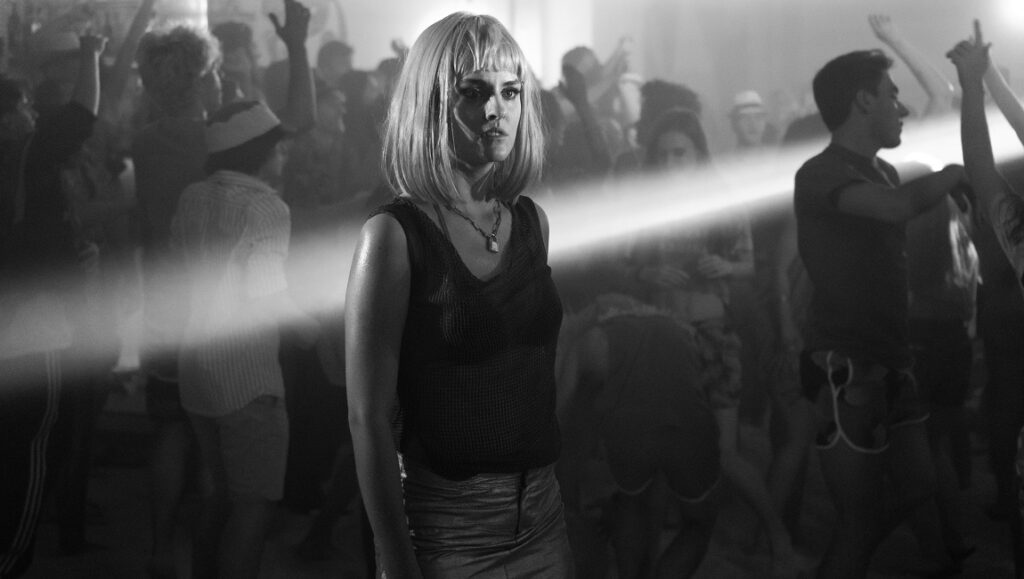Paris, 13th District succeeds in communicating something distinctly, relatably human, even as it falters to present captivating drama.
There’s something particularly soul-crushing about being lonely in a metropolis. An environment meant to socially concentrate instead atomizes. Jacques Audiard’s Paris, 13th District begins silently, a gliding overhead shot tracking through the cityscape with the cold, objective detachment of a surveillance drone. It arrives at the district of residential towers known as Les Olympiades. Lit windows betray brief glimpses of individual lives, stories that will never be told, stories that exist beyond the frame. It’s a fitting start, as these panel-like urban squares allude to the film’s American comic book origins. Adrian Tomine, the cartoonist whose stories Amber Sweet, Killing and Dying, and Hawaiian Getaway loosely inspire the movie’s plot, often addresses issues of identity, isolation, and disappointment in his works. He produces illustrations with a pleasantly muted pastel aesthetic that still achieve a stunning clarity in their unfussy candor. Paris, 13th District manages to translate those thematic ideas for the screen, but falls short of generating the poignance it clearly intends to.
The film immediately introduces its protagonist, Émilie (Lucie Zhang), and deuteragonist, Camille (Makita Samba), in a steamy flashforward. Camille meets Émilie when responding to a roommate application, and since it’s already revealed that these two hook up, the film wastes no time getting the romantic ball rolling with some suggestive dialogue and longing stares. Émilie quickly falls for Camille, but Camille isn’t one to restrict his options and doesn’t requite her affection. After some personal setbacks, Camille encounters the tritagonist, Nora (Noémie Merlant), who’s in Paris to restart her own life, and his immediate infatuation with her ignites a sexual fling that’s stunted by Nora’s suppressed shame. After Nora’s mistaken for a cam girl named Amber Sweet (Jehnny Beth), the two strike up an online acquaintance that slowly blossoms.
If that sounds a bit loose and messy, well that’s because it is. Paris, 13th District is fundamentally a piece of slice-of-life cinema. The lack of pronounced stakes and plot development engenders a meandering experience where the characters don’t progress so much as they fumble forward. Their conflicts are all internal, so deeply embedded in their psyches that Freud would have a field day. Émilie is a sweet, aimless egotist who is detached from her family and loves a good slow-motion reverie. Camille can radiate toxic “nice guy” energy, but underneath his exterior is a bitter cynicism about what he can make out of his life. Nora builds a confident shell around her fragile, doubt-ridden soul. These are deeply unhappy people who ought to be enjoying the primes of their lives, but they instead find themselves trudging through a succession of interwoven arbitrary events, packed with content but light on substance. Each central character gets no more than some rough sketching of a backstory, just enough to communicate what they might be running from or trying to bury. Each could benefit from additional narrative attention, maybe a season’s worth on some French equivalent of the HBO Max series Love Life. Indeed, Paris, 13th District does come off like an anthology series condensed, the main cast rotating in and out of focus, sometimes sidelined for extended periods where they might as well be frozen in amber until a scene featuring them kicks off. This choppiness undermines the flow of the film, stretching things thin while still leaving the viewer overstuffed.
Shot mostly in black-and-white, Paris, 13th District possesses a distinctly glossy but airless quality. The monochrome enhances the sense of estrangement, as if the Audiard is delivering a social dispatch from a dimension adjacent to this one. Gray pervades and flattens all. It alienates. It encapsulates that quintessentially Parisian existential tenor. Cinematographer Paul Guilhaume captures this specific essence with his lens: Paris is all towering edifices, sad studios, humdrum offices, wide-shot streets bustling while still somehow seeming vacant. Yet this visual language, held back by its merely satisfactory narrative complement, achieves only a clinical elegance, remaining a step removed from offering up a significant vision.
What endears but ultimately limits the film is how small it feels. For all its style, the diversity of its cast, the caliber of its naturalistic performances, it doesn’t have that much to say beyond presenting authentic impressions of navigating a disconnected world. Observations and confrontations exist in lieu of conversations. Some digital technologies cheapen relations (dating apps), while others strengthen them (video chats). The events wrap up not feeling like they’ve reached any conclusion, but more so that the viewer’s allotted time peering through the window has run out. Audiard’s latest may not make for the most captivating drama, but it succeeds in distilling a sensation that is so relatably human, missteps and all. That ought to still be recognized as an achievement.


Comments are closed.